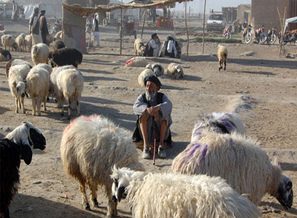AFGHANS HOPE FOR STABILITY, COLORFUL ‘EID


Kabul, 9 Dzulhijjah 1435/4 October 2014 (MINA) – With Islamic holy festival, `Eid Al-Adha, just round the corner, devotee Muslims in Afghanistan are eagerly preparing their udhiyah to welcome the holy day, enjoying a comparatively rare, relaxed political environment.
“Ever since the political environment has eased, following a deal between the rival presidential candidates and formation of a unity government, all of a sudden people are spending more and more,” local cattle trader Muhamamd Hashim.
Being an agricultural country, Afghanistan has an abundance of sacrificial animals, Onislam quoted by Mi’raj Islamic News Agency (MINA) as reporting, Saturday.
Yet, to meet the growing demand for udhiyah, nomads and traders bring-in the additional supplies from neighboring countries, especially Pakistan.
Despite the relaxed atmosphere, Hashim, however, acknowledges that some negative impacts of the past were still haunting the traders.
“Unlike past, we could not dare to buy and stock animals since we were uncertain about the future prospects,” the 57 years old Afghan cattle farmer said, adding that last moment buying caused a price-hike that would ultimately be passed to down to the consumers for obvious reasons.
Price of a mid-size sheep ranged between 10,000 afs (2 million IDR ) to 15,000 afs (1,7 million IDR).
Meanwhile, a cow ranged between 40,000 afs (9 million IDR) till 55,000 ( 10 million IDR ), which is around 15 per cent higher than the previous year.
For Afghans, sheep remains the favorite pick for udhiyah in this mountainous country for two obvious reasons, Haji Abdul Qadir, an elderly in downtown Kabul, told OnIslam.
“Firstly and foremost it has a direct relevance to the Sunnah and secondly lamb or sheep meat is a traditional part of our cousin so you can understand,” Haji Qadir said with a smile.
`Eid Al-Adha, or “Feast of Sacrifice”, marks the end of the Hajj season and is one of the two most important Islamic celebrations, together with `Eid Al-Fitr.
A financially-able Muslim sacrifices a single sheep or goat or shares with six others in sacrificing a camel or cow as an act of worship during the four-day `Eid Al-Adha celebrations.
The ritual commemorates Prophet Ibrahim’s willingness to sacrifice his son Ismail to Allah as an act of obedience and submission.
The Udhiyah meat is divided in three equal parts, one each for one’s own family, friends and the poor.
What `Eid
Unlike the capital Kabul, where state machinery is functioning swiftly to ensure a relative peace and order, many southern and eastern parts of Afghanistan still witness violence on daily basis.
Thousands of families from southern Helmand province have migrated elsewhere in search for peace as Taliban and government forces are engaged in bloody battles there for the past three months.
“We are not thinking about Qurbani (Persian word for udhiyah) and `Eid festival at the moment,” Abdullah, an internally displaced man from Sanging, told OnIslam in Kabul.
He added that his whole village from Helmand’s Sangin district have been uprooted now and depend heavily on aid.
“We just hope and wish peace would prevail so that we can get back to our home and fields” he said in response to a question.
Religious leader and social activists have been campaigning for a while now, urging the well-off Afghans to remember their brethren from Sangin and other restless parts of the poor and war-ravaged country.
The past experience has proven that the `Eid festivals have brought addition fears of a massive attacks instead of an innocent joy to the Afghan people, especially in the insurgency-hit southern eastern and some northern provinces.
On its part, the government has vowed to ensure foolproof security around mosques, bazaars, highways and other public places where people might gather to meet and greet each other on this holy day.
Abdullah of the Sangin district recalls that it was the first day of `Eid Al-Fitr when a community leader among his fellows was targeted by a suicide bomber in neighboring Kandahar province.
“We are going through extremely difficult times, though no one is holding our threats to prevent us from breathing but actually the circumstances are as such that living a normal and fearless life has become near impossible for the Afghans,” the dejected and gloomy man added.(T/P008/P3)
Mi’raj Islamic News Agency (MINA)



